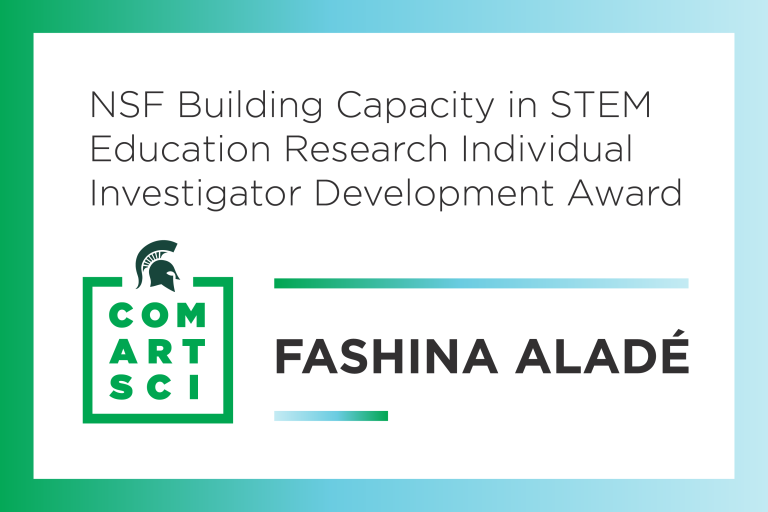For Fashina Aladé, Ph.D., understanding how media impacts the learning and development of young children is the primary focus of her research in and outside of MSU. Aladé has been an assistant professor in the Department of Advertising and Public Relations at MSU for five years where she investigates the intersections of media effects, developmental psychology and early childhood education. In addition, she also has an appointment in Human Development and Family Studies.
Her passion to understand the ways technology can positively impact children’s learning and development is evident in her newest project, recently funded by the National Science Foundation (NSF). The Building Capacity in STEM Education Research program has recently granted Aladé with funding for her 3-year project, “Using Child-Centered Qualitative and Multi-Method Approaches to Investigate Children’s Understanding of Racial Diversity Cues in STEM-focused Educational Television.”
Aladé is set to begin her research in January 2023 where she will study how children view and respond to diverse portrayals in STEM-focused media. Over the past few years, there has been a steady increase in STEM-focused educational television programs for kids with an added push for further inclusivity within the genre. Producers and creators of these programs hope that the greater the representation in these programs, the more engagement there is from racially diverse children in STEM. However, there is not enough conclusive evidence to support that yet.
In order to develop approaches for these STEM-focused programs to reach Black, Latinx and Indigenous children, there needs to be more conclusive evidence that this connection exists. As a result, Aladé will use this grant to conduct further research that explores the relationship between children viewing diverse portrayals in STEM media and who they think belongs in those STEM settings.
First, Aladé plans to conduct a qualitative study exploring children’s attention to and interpretation of diversity cues in these STEM-focused programs.
“The first part of the project will involve conducting in-depth semi-structured interviews with preschool-aged children and their parents to better understand what they notice about the characters in STEM programs that are designed to demonstrate various aspects of diversity,” said Aladé. “Part two will be a multi-method study that explores the relationship between children’s viewing of STEM-focused educational television programs and their perceptions of who belongs in STEM.”
Aladé expresses a deep gratitude for being able to conduct this research which she hopes will further encourage and diversify participation in STEM settings. The representation of diverse communities in STEM is essential in raising engagement.
“It’s incredibly validating to receive this type of federal-level funding. This research area is quite new, so being awarded this grant means that there is broader interest in the research questions that I am passionate about, and that the NSF sees promise in me as a potential rising leader in this field,” said Aladé. “It also shows that the NSF is really invested in broadening participation in STEM and in STEM education, and that they value media as one way to reach and positively impact children.”
By Casey Halas
